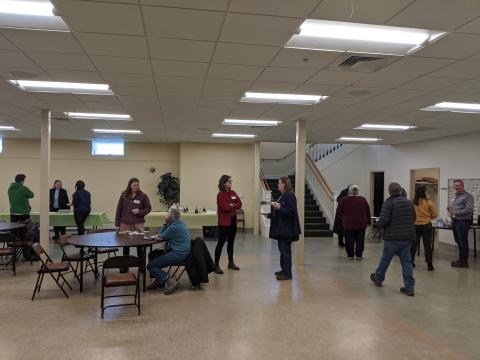Connecting Local Food Producers to Local Buyers
Many farmers and smaller-scale food producers rely mainly on direct-to-consumer (DTC) methods such as farmers markets and community supported agriculture (CSA) programs to sell their products. A 2012 study from the U.S. Department of Agriculture found that 70 percent of farms that sell products locally used only DTC methods, whereas only 30 percent used (or also used) intermediated channels. As many farmers and food businesses look to diversify their income streams or create more reliable week-to-week earnings (especially following the uncertainties and changes brought on by the COVID-19 pandemic), finding new distribution channels can be critical for business success. Furthermore, research from the past few years has indicated that consumer interest in buying local foods grew significantly during the pandemic, and much of this interest has remained. Research from GlobalData in 2020 found that 52% of consumers worldwide believed that locally-sourced ingredients were more important now as a result of the Covid-19 pandemic, a finding which seems to be backed up domestically in data analyzed by Michigan State University. Analyses from the U.S. Chamber of Commerce indicate that as of 2021, 56% of consumers were shopping at neighborhood stores or buying locally sourced products.

This consumer interest in buying and eating local is visible in the Lakes Region’s restaurant scene, but there’s still room to grow. In downtown Laconia, for instance, restaurants such as Trillium Farm to Table and The Local Eatery highlight a variety of local ingredients on their menus, and Defiant Records and Craft Beer proudly features an extensive and rotating assortment of regional beers and wine. Nevertheless, plenty of other businesses in the area have probably not given much thought to including local products. One reason for this may be that it’s hard to know where to start or where to look to make the right connections or find the products that fit specific needs.
These are problems that the Lakes Region Farmer-Buyer Meet & Greet event aims to address. On a sunny but chilly late January afternoon in Gilford, NH, a variety of Lakes Region farmers, food producers, business owners and organizations came together to show their products (with delicious samples!) and start these conversations about what local sourcing arrangements could look like for them. The event was co-organized by UNH Cooperative Extension (led by Kelly McAdam, Food and Agriculture Specialist, and Rachel Carow, Belknap County Administrative Assistant), Belknap County Conservation District, and the NH Farm to School program, guided in part by the collaborative Lakes Region Food Network group. Lakes Region Chamber of Commerce and Lakes Region Tourism Association helped to get the word out, recognizing that events like this can be highly valuable for restaurants, hotels, and other local businesses. Hospitals and schools are other key potential buyers, each who have a particular interest in bringing fresh and nutritious foods to those they serve.
In this inaugural year, the meet-and-greet was a smaller-scale event with plenty of opportunity for networking and information sharing. Greens and Beans Farm in Gilford is currently expanding their wholesale business, so events like this provide a way for them to showcase their range of products, from ready-made baked goods to savory appetizers. For others, such as Todd’s Sugar Works in Belmont, connecting with potential buyers can be an important way to broaden their products’ distribution beyond their own farm stand or sugarhouse. And it’s not just edible farm products that may be of interest to local buyers, as Sawyer Farm from Gilford displayed an array of homemade soaps, solid shampoos, and body products that could offer a special local touch to a bed and breakfast or a gift shop. Genuine Local, based in Laconia, displayed examples of hot sauces and salsas made at their facility which processes food products for a variety of local farmers and entrepreneurs. There’s clearly interest in this type of event for other parts of New Hampshire as well, as one participant came all the way from Milton Mills (along the Maine border in Strafford County) representing Branch Hill Farm, a nonprofit farm that offers a variety of vegetable, fruit, berry, maple and meat products to consumers.
Are you a farmer or buyer interested in making these types of connections in your area? Cooperative Extension may be able to help guide the way or make some introductions. If you’re a consumer looking to enjoy more delicious local products when you eat out or shop local, you can let the business owners and managers you know that this can be appealing to consumers and more logistically feasible than they may realize.
For more information about UNH Extension’s Food and Agriculture program offerings, contact Kelly McAdam (kelly.mcadam@unh.edu).
More information about this event's collaborators Belknap County Conservation District is available here.

Sources:
USDA (2015). “Trends in U.S. Local and Regional Food Systems: A Report to Congress” https://www.ers.usda.gov/webdocs/publications/42805/51173_ap068.pdf
GlobalData/JustFood (2020). “Demand for local food to last beyond Covid-19” https://www.just-food.com/comment/demand-for-local-food-to-last-beyond-covid-19/
Michigan State University Extension (2020). “How food purchasing changed in 2020 – Did we get it right?” https://www.canr.msu.edu/news/how-might-covid-19-change-food-purchases-…https://www.canr.msu.edu/news/how-might-covid-19-change-food-purchases-this-summer
U.S. Chamber of Commerce (2021). “Hyper-Local Commerce and Smaller Brands Benefit From Post-Pandemic Consumer Trends” https://www.uschamber.com/co/good-company/launch-pad/post-pandemic-consumers-demand-smaller-brands

